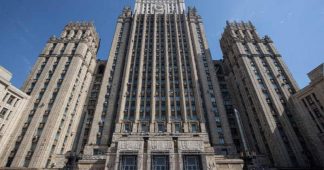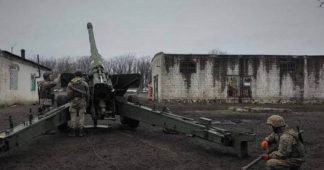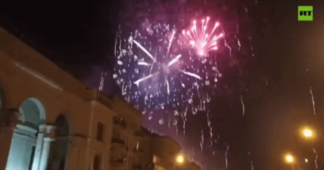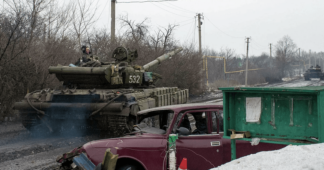Over the past two weeks, media headlines worldwide have been dominated by the Russian military intervention in Ukraine – launched in response to almost nine years of Western provocations, beginning with the CIA and MI6 orchestrated Euromaidan colour revolution in November 2013, following then-President Viktor Yanukovych’s decision to suspend an EU trade deal in favour of closer ties with Russia, which in turn would to lead the predominantly ethnic Russian Donetsk and Luhansk People’s Republics in the eastern Donbass region breaking away from Kiev’s control in April 2014, the catalyst for this secession being the anti-Russian far-right sympathisers that would make up the Western-backed post-Maidan government of Petro Poroshenko.
A near eight-year long war on both Republics would follow, involving Kiev-supported neo-Nazi factions such as Azov Battalion and Right Sector, leading to an estimated 14,000 deaths, a conflict that Moscow would seek to resolve through diplomatic means via the Minsk Agreements, which would see a federalisation solution in which Donetsk and Luhansk would be granted a degree of autonomy whilst still remaining under Ukrainian rule – the failure by Kiev to implement their side of the agreements however, as well as the ongoing attacks on the ethnic Russians in the Donbass and the inevitability that Ukraine would ultimately go on become a NATO member and host weapons and troops intended to attack Russia, would ultimately force Moscow into launching a military intervention into its Western neighbour in order to demilitarise and de-Nazify the country.
Two weeks into the conflict, it has become apparent from the corporate media narrative of the ‘Ukrainian resistance’ that the goal of the US and its allies, with little regard for the Ukrainian civilians they claim to care about, is to drag Moscow into a military quagmire in the second largest country in Europe – a tactic with historical usage against the Kremlin, when in 1979, at the height of the Cold War, the CIA and MI6 would begin a covert operation of arming and training Islamist fundamentalists, including Osama Bin Laden, known as the Mujahideen, who would go on to wage war on the then-Socialist government of Afghanistan – leading to a ten-year long Soviet military intervention, something which many commentators have seen as a contributing factor to the subsequent break-up of the bloc in 1991; indeed, Zbigniew Brzezinski, National Security Advisor to US President Jimmy Carter when Operation Cyclone was launched in 1979, would later recount in a 1998 interview about how drawing the USSR into a costly military intervention was a motivating factor in its inception.
Despite the intention of the Neocons and the war lobby to being to seemingly draw the Russian Federation into an Iraq war-style quagmire however, there also appears to be an element who favour an approach which would lead to far more grave consequences – a Libya-style no fly zone over Ukraine, involving the shooting down of Russian aircraft by NATO, which would undoubtedly trigger a catastrophic third world war involving the use of nuclear weapons.
Ukrainian President Volodymyr Zelensky, a newfound darling of the Western media since their coverage of the Russian intervention began, has repeatedly called for the implementation of a no fly zone over his countries’ skies, World Economic Forum-linked Ukrainian activist Daria Kaleniuk went viral with her plea for British Prime Minister Boris Johnson to intervene militarily against Russian forces, and a recent poll by corporate media outlet Reuters found that 74% of Americans supported a no fly zone over Ukraine – with it remaining unclear on whether those polled were aware of the nuclear apocalypse that such a measure would entail.
Despite this push for a Western military intervention in Ukraine, US President Joe Biden, Boris Johnson and NATO Secretary General Jens Stoltenberg have made it clear that such a measure is off the table, each citing the global nuclear conflict that would undoubtedly follow as the reason – though this may seem a reason to be optimistic that the current Ukraine crisis won’t develop into World War III however, it does not rule out the far more hawkish members of the regime change lobby seeking to carry out a false flag operation in Ukraine, one with the intention of implicating Moscow, and to push public and political opinion even more towards support for a NATO intervention, a tactic with very recent usage.
In 2017, the Syrian Arab Republic had been in the six-year long grip of a Western-backed regime change operation launched in response to Syrian President Bashar al-Assad’s 2009 refusal to allow US-allied Qatar to build a pipeline through his country, one that would have undermined his relationship with key-ally Russia. Like the aforementioned Operation Cyclone, Timber Sycamore would see the arming, funding and training of Wahhabi terrorists groups by the West and its allies, with the intention of removing Assad’s secular government and replacing it with a Western-friendly leadership.
In June 2013, Iran and Hezbollah would intervene in the ensuing proxy war at the request of the Syrian government, providing a key role in assisting Damascus in repelling the Western-backed terrorist campaign; what would perhaps be the most decisive factor in turning the tide of the conflict in the Arab Republic’s favour however, would come in September 2015 – a Russian air campaign, again at the request of the Syrian government, targeting the terrorist groups, and which allowed Damascus to retake the vast swathes of Syrian territory which had come under their control, such as the key city of Aleppo.
With the Syrian regime change operation not going as planned, Washington’s Neocons would soon resort to desperate – and reckless – measures.
On the 4th of April 2017, a false flag chemical attack took place in the Syrian town of Khan Shaykhun, the blame immediately being placed on Damascus and resulting in the then-US administration of Donald Trump launching cruise missiles strikes on a Syrian government airbase three days later, a highly provocative action though one that just stopped short of the full-scale military intervention that the regime-change lobby had clamoured for – undeterred, the same tactic would be carried out a year later in the city of Douma, which again would result in the US, Britain and France launching air strikes against Syrian government targets, also just stopping short of a full-scale intervention.
This is not to discount the grave seriousness of NATO launching a military strike against a Russian ally and the potential consequences that that action could have entailed however, and should a similar false flag operation take place in Ukraine, perhaps also involving chemical weapons or a nuclear reactor as Moscow itself has warned of in recent days, even a ‘limited’ strike against Russian military infrastructure would immediately place the world on an irreversible path to the most grave consequence of all – nuclear war.
Published at theduran.com
We remind our readers that publication of articles on our site does not mean that we agree with what is written. Our policy is to publish anything which we consider of interest, so as to assist our readers in forming their opinions. Sometimes we even publish articles with which we totally disagree, since we believe it is important for our readers to be informed on as wide a spectrum of views as possible.











